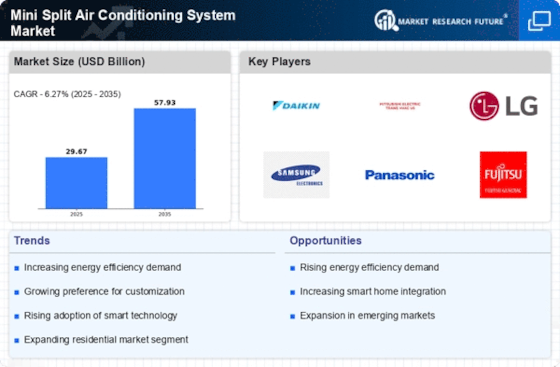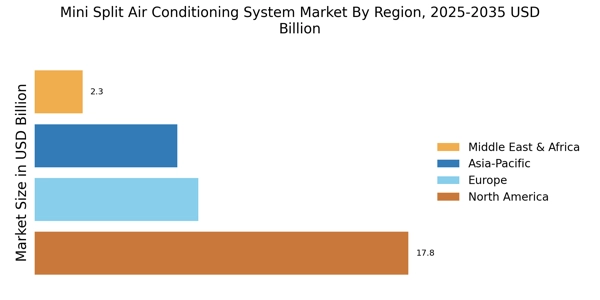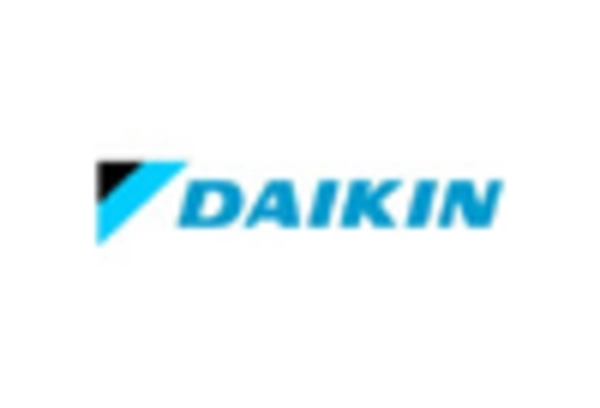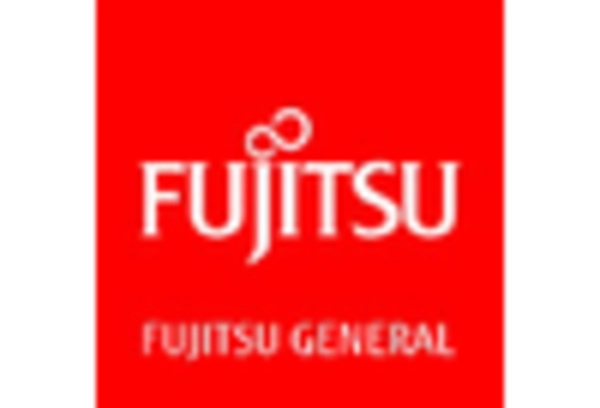Increased Focus on Indoor Air Quality
The Mini Split Air Conditioning System Market is witnessing a heightened focus on indoor air quality (IAQ). With growing awareness of health issues related to poor air quality, consumers are increasingly prioritizing systems that offer superior filtration and air purification features. Mini split systems often come equipped with advanced filtration technologies that can effectively remove allergens, dust, and pollutants from indoor air. This is particularly relevant in urban areas where air quality can be compromised. According to industry reports, the demand for air purification features in HVAC systems is projected to grow significantly, further driving the Mini Split Air Conditioning System Market. As consumers become more health-conscious, the emphasis on IAQ is likely to remain a key driver in the market.
Technological Advancements in HVAC Systems
Technological advancements are playing a pivotal role in shaping the Mini Split Air Conditioning System Market. Innovations such as inverter technology, which allows for variable speed operation, have revolutionized the efficiency and performance of mini split systems. These advancements enable systems to adjust their cooling output based on real-time demand, leading to substantial energy savings. Furthermore, the integration of smart technology, including Wi-Fi connectivity and mobile app controls, enhances user convenience and system management. As consumers increasingly seek modern, user-friendly solutions, the demand for technologically advanced mini split systems is expected to rise. This trend indicates a shift towards more sophisticated HVAC solutions, positioning the Mini Split Air Conditioning System Market for robust growth in the coming years.
Rising Demand for Energy-Efficient Solutions
The Mini Split Air Conditioning System Market is experiencing a notable surge in demand for energy-efficient solutions. As consumers become increasingly aware of environmental issues and rising energy costs, they are seeking systems that offer lower energy consumption without compromising performance. According to recent data, mini split systems can achieve energy efficiency ratings of up to 30 SEER, significantly higher than traditional HVAC systems. This efficiency not only reduces utility bills but also aligns with global sustainability goals. Consequently, manufacturers are focusing on developing advanced technologies that enhance energy efficiency, thereby driving growth in the Mini Split Air Conditioning System Market. The trend towards energy-efficient solutions is likely to continue, as both residential and commercial sectors prioritize sustainability in their purchasing decisions.
Government Incentives for Energy-Efficient Systems
Government incentives aimed at promoting energy-efficient systems are emerging as a crucial driver for the Mini Split Air Conditioning System Market. Various governments are implementing programs that provide financial incentives, tax credits, and rebates for consumers who invest in energy-efficient HVAC solutions. These initiatives are designed to encourage the adoption of technologies that reduce energy consumption and greenhouse gas emissions. As a result, consumers are more inclined to consider mini split systems, which are recognized for their energy efficiency. The availability of such incentives is likely to stimulate market growth, as it lowers the financial barriers for consumers. This trend suggests that government policies will continue to play a vital role in shaping the Mini Split Air Conditioning System Market.
Expansion of Residential and Commercial Construction
The expansion of residential and commercial construction is significantly influencing the Mini Split Air Conditioning System Market. As new buildings are constructed, there is an increasing trend towards installing mini split systems due to their flexibility and ease of installation. These systems are particularly advantageous in retrofitting older buildings, where ductwork may be impractical. Recent statistics indicate that the construction sector is poised for growth, with a projected increase in new housing starts and commercial projects. This expansion creates a favorable environment for the adoption of mini split systems, as builders and developers seek efficient and cost-effective HVAC solutions. Consequently, the growth in construction activities is expected to bolster the Mini Split Air Conditioning System Market in the foreseeable future.

















